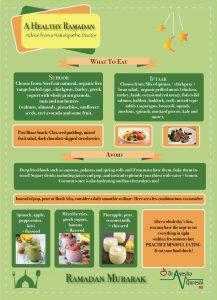The holy month of Ramadan is around the corner. Muslims will be fasting from dawn to dusk for 30 days. Fasting during the month of Ramadan provides spiritual discipline and personal development to millions of Muslims each year.
As summer is approaching and fasts are getting longer, the importance of eating high quality nutritious foods is necessary to obtain the full benefits during the holiest month in the Islamic calendar. Suhoor is the morning meal eaten before sunrise and iftaar is the meal upon breaking the fast at sunset.
If you come from a South Asian family (like I do), then you may be accustomed to eating a carbohydrate-rich suhoor consisting of rotis, parathas and breads, and iftaars made up of deep fried foods like samosas, spring rolls and pakoras followed by Rooh Afza (a sugary artificial flavoured drink). These foods seem satisfying and ‘hit the spot’ after a long day of food deprivation but high carbohydrate fried foods are not nutrient dense and make us feel full quicker! This can be problematic in Ramadan because food intake is below normal and there is a limited time to consume food.
As a Naturopathic Doctor, I am often asked what are the most nutritious, high energy yielding foods to consume during suhoor and iftaar? Here are my general recommendations:
Suhoor: Protein-rich, complex carbohydrates and good quality of fats should be the goal for Suhoor. Complex carbohydrates are recommended to help release energy slowly during a long day’s fast. Complex carbs include barley, oats, wholemeal flour, beans and lentils. Fibre rich foods are also beneficial as they are satiating, normalize bowel movements and lower cholesterol levels and help control blood sugar levels. Protein rich foods will help curb blood sugar levels and carbohydrate cravings while having positive effects on metabolic and cardiovascular health. Avoid simple carbohydrates as they provide instant source of energy but are digested faster. Simple carbohydrates include foods containing processed refined sugar and white flower, high fructose corn syrup often found in soda pop, cereals, cookies, etc.
Iftaar: Have a balanced meal but consider high protein and low carbs, especially if you are looking not to gain the extra pounds that many ironically experience during ramadan. Avoid fried foods and high sugar foods that contain empty calories and will fill you up without meeting your nutritious needs.
Avoid fried foods such as samosas and pakoras, and if you must have them, bake them instead! Deep-fried foods often contain trans fat and are rich in empty calories which can cause fatigue and sluggishness throughout the day. Aim to bake or grill your foods instead!
6) Hydrate! During eating hours be sure to drink your daily water consumption of 8 glasses. Keep water bottles during evening prayers. Avoid sugary drinks including juices and pop, and instead replenish your thirst with water + lemon. Coconut water is also hydrating and has electrolytes too!
7) Do you experience increased thirst during the day? Limit overly salty foods and caffeine during suhoor as they cause water to flush out resulting in increased thirst.
8) After a whole day’s fast, you may have the urge to eat everything in sight within a few minutes but practice mindful eating and eat your food slowly. Take smaller portion sizes will allow time for your stomach to signal your brain that its been eating. This is essentially useful to prevent over-eating!
Hope you found these tips helpful. Ramadan Mubarak!! 🙂
Leave a Reply